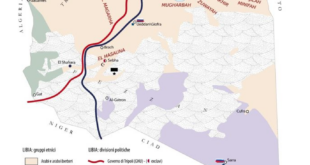TRIPOLI (Reuters) – Top U.S. diplomat Condoleezza Rice arrived in Tripoli on Friday on the first trip by a U.S. secretary of state to Libya since 1953, and said it was proof that Washington had no “permanent enemies”.
Rice was set to meet Libyan leader Muammar Gaddafi during her brief trip, which Washington hopes will end decades of enmity and violence and comes five years after Libya gave up its weapons of mass destruction program in 2003.
“This demonstrates that the U.S. doesn’t have permanent enemies,” Rice told reporters traveling with her to Tripoli.
“It demonstrates that when countries are prepared to make strategic changes in direction, the United States is prepared to respond. Quite frankly I never thought I would be visiting Libya and so it is quite something,” she said.
“This trip is acknowledging how far the U.S.-Libyan relationship has come, but it is the beginning and not the end of the story.”
U.S. Secretary of State John Foster Dulles was the last top U.S. diplomat to visit Tripoli and made the trip in May 1953, before Rice was born.
After meeting Libya’s Foreign Minister Mohammed Abdel-Rahman Shalgam, Rice was expected to share an Iftar diner with Gaddafi, the traditional meal breaking the fast during the Islamic holy month of Ramadan.
Rice held back from visiting Libya until a compensation package was signed last month to cover legal claims involving victims of U.S. and Libyan bombings.
Rice said she was looking forward to meeting Gaddafi — once called “the mad dog of the Middle East” by President Ronald Reagan — and planned to discuss, among other issues, the conflict in Sudan and Libya’s “important” role there.
Gaddafi has in the past expressed admiration for Rice.
“I support my darling black African woman,” he said in an interview with al Jazeera last year. “I admire and am very proud of the way she leans back and gives orders to the Arab leaders,” he continued. “I love her very much. I admire her, and I’m proud of her, because she’s a black woman of African origin.”
HUMAN RIGHTS ISSUES
Rice may sign a trade and investment deal during her visit.
Washington is also negotiating a “military memorandum of understanding” with Libya, which cooperates in fighting terrorism and has helped stem the flow of insurgents into Iraq, the State Department said, without giving details.
Rice is also expected to raise some human rights issues and to push Gaddafi on the compensation deal signed on August 14.
Libya finalized the legal arrangements on Wednesday for setting up a fund into which money will be paid, but one senior U.S. official said it would take “more than days” before payments could be made to both sides.
U.S. victims covered include those who died in the 1988 bombing of Pan Am Flight 103 over Lockerbie, Scotland, which killed 270 people, and the 1986 attack on a Berlin disco that killed three people and wounded 229.
It also compensates Libyans killed in 1986 when U.S. planes bombed Tripoli and Benghazi, killing 40 people.
Rice has come under some domestic U.S. criticism for making the trip before the money was paid out. Rights groups are critical because some cases, such as that of ailing political dissident Fathi el-Jahmi, have not been resolved.
Jahmi’s brother Mohamed El-Jahmi, who lives in the United States near Boston, said Rice was wrong to see Gaddafi while his brother, a former provincial governor, was held in a “bugged, cockroach-ridden” hospital room.
Democratic vice presidential candidate Sen. Joe Biden has taken up Jahmi’s case and Mohamed el-Jahmi said he hoped Rice would do the same. “The secretary of state is now going to provide legitimacy to a dictator. She knows fully that my brother could be killed,” he told Reuters.
After going to Tripoli, Rice is set to visit Tunisia, Algeria and Morocco before returning to Washington on September 7.
 Eurasia Press & News
Eurasia Press & News

